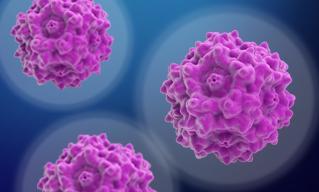Before administration of a gene therapy, patients must be screened for the presence of pre-existing antibodies specific to the treatment being delivered. New research is underway to assess how common antibodies are in people with Duchenne muscular dystrophy, enabling further exploration for overcoming the presence of pre-existing antibodies.
Throughout the COVID-19 pandemic, we have all learned a lot about antibodies. Antibodies form the defense system in the human body. An antibody is a protein that can recognize invaders to the body respond to help fight off an infection. As your body recognizes these invaders and tries to recover, it generates antibodies to help fight off the infection.
Antibodies remain in the body even after you recover, which means if you were exposed again the antibodies would recognize the invaders and try to fight a virus before you got sick. Interestingly, some people can develop antibodies even if exposure to an infection didn’t make them sick.
Antibodies and Gene Therapy
What role do antibodies play in gene therapy?
The vehicles used today for delivering gene therapy to the body are called vectors. Many investigational gene therapies use an adeno-associated virus or AAV as the vector. These vectors are viruses that are not known to cause disease in humans. Because AAVs are found in nature, it’s possible that a person has been exposed to the AAV virus and formed antibodies. If that’s the case, antibodies will be present prior to delivering gene therapy. These antibodies can hamper therapeutic efficacy and pose a safety concern by recognizing the vector and mounting a defense against the AAV gene therapy. When this occurs, the immune system can mount an inflammatory response to the AAV, which can cause harm against the body it is supposed to protect. The body’s response also prevents the gene therapy from doing its intended job of delivering the corrected or replacement gene to the targeted cells.
In addition to pre-existing antibodies, when individuals first receive an AAV gene therapy, they will develop antibodies to the vector. These post-treatment antibodies are the reason investigational gene therapies are currently considered a one-time therapy.
As researchers develop investigational gene transfer therapy for genetically based disease, understanding the presence of antibodies is important in two critical ways: 1) for individuals planning to receive treatment and 2) how frequently these antibodies occur across a specific population to inform future treatment.
How Seroprevalence Studies Inform Research
For individuals planning to be treated with gene transfer therapy, they will undergo a test to determine whether they have pre-existing antibodies to a specific vector prior to receiving treatment. The test performed is specific to the gene therapy selected for treatment. If an individual tests positive for pre-existing antibodies prior to gene therapy, it may make the individual ineligible to receive that specific gene therapy.
Testing individuals prior to treatment is essential for protecting their health and safety. There is also a need to better understand the presence of antibodies in a broader population to inform future research. Seroprevalence is a scientific term used to describe the presence of antibodies in the blood to a specific virus or other infectious agent. Seroprevalence studies involve the process of collecting information in a given population to determine who has antibodies to a specific protein. This information can determine what percent of a population may be positive.
Sarepta enrolled a seroprevalence study in the United States called EXPLORE DMD, assessing approximately 100 boys between the ages of 4-17 with Duchenne muscular dystrophy to determine how many individuals are positive for pre-existing antibodies to rAAVrh74. The study was conducted virtually in response to both the pandemic and feedback from the community to make participation in this study more convenient for participants and their caregivers. This virtual format allowed patients to provide consent for the study and enroll at home. Additionally, the blood draw required for the study could be performed in the home or at a local laboratory, so no visits to a study site were required.
The study will provide important data for health care professionals, regulators, payers, and researchers by determining the percent of the population with antibodies to rAAVrh74.
While research studies help inform a broad body of knowledge, the implications for individuals participating in EXPLORE DMD can be significant, potentially affecting eligibility for future treatment. As a result of feedback from the community about the significance of pre-existing antibodies, Sarepta partnered with Parent Project Muscular Dystrophy (PPMD) to provide support for patients and clinicians. The organization served as a resource for patients who chose to have a PPMD support specialist, such as a nurse, advanced practice nurse, researcher, or certified genetic counselor on a call in which a patient received their results. Patients could also elect to receive a follow up call from a PPMD certified genetic counselor to discuss results and the clinical trial landscape.
“Research is critical to improving the lives of patients with Duchenne,” said Eric Camino, PhD, vice president, Research and Clinical Innovation at PPMD. “By offering support to EXPLORE DMD, we wanted to ensure that patients understood the results and what they meant for them and their specific situation by offering an additional source of support to help interpret the results and understand implications for potential clinical trial participation in the future.”
Sarepta uses the rAAVrh74 vector in several of its investigational gene therapies for genetically based neuromuscular diseases. The vector was chosen for two key reasons: the ability of the vector to target heart and muscle tissue, and for the low rates of pre-existing antibodies (17 percent) to rh74, consistent with what was shown in an earlier study of 95 patients with Duchenne and limb-girdle muscular dystrophies.
New Study Results Confirm Low Rates of Pre-existing Antibodies to rh74
Results among 101 patients enrolled in the EXPLORE DMD study presented at the 2022 Muscular Dystrophy Association Clinical and Scientific Conference* showed that 86 percent of patients were sero-negative — or did not have elevated antibodies to rh74.
“We’re incredibly grateful to the young men and boys who enrolled in the Explore DMD study, as their participation was an act of selflessness in answering the specific question about seroprevalence and by informing the overall body of knowledge around gene therapy. We’re also encouraged by the results showing low rates of pre-existing antibodies to the rh74 vector” said Teji Singh, M.D., vice president, head of clinical development, Sarepta. “The results from EXPLORE DMD reinforce our commitment to finding ways to ensure patients will have access to potential gene therapies.”
*Goedeker NL, et al. Evaluation of Total Binding Antibodies Against rAAVrh74 in Patients with Duchenne Muscular Dystrophy. Presented at the Muscular Dystrophy Association Clinical & Scientific Conference, March 13-16, 2022.
Resources
The study is fully enrolled, but visit the EXPLORE DMD website for more information
Additional information on gene therapy is available through GT-FAQ on Sarepta’s YouTube channel.



